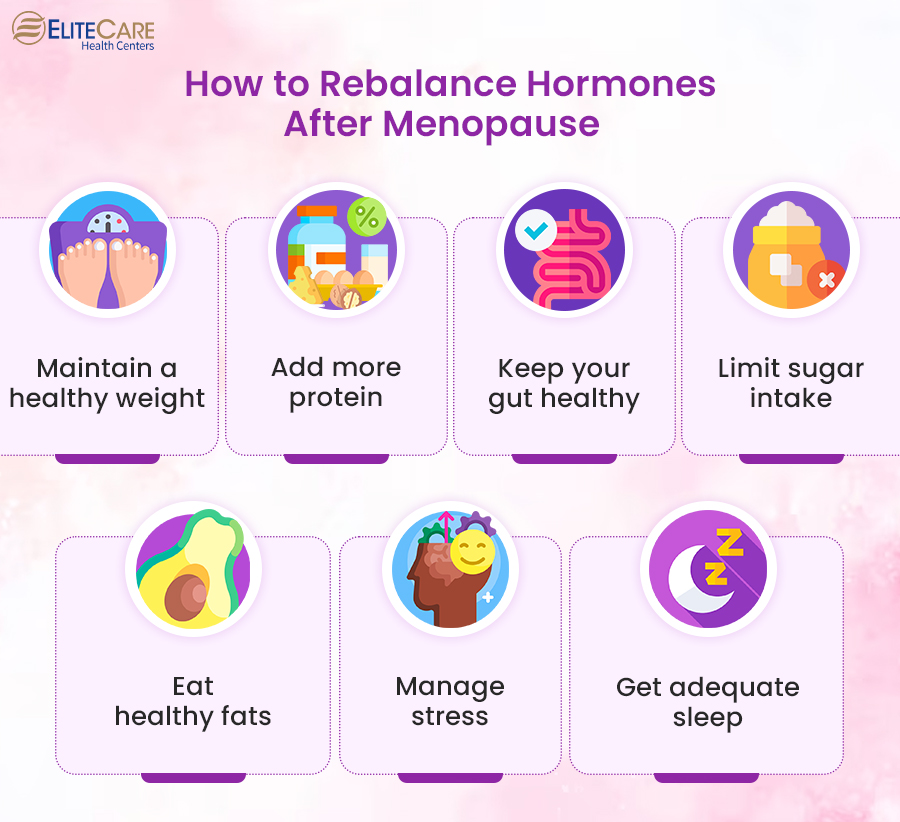
Menopause is a natural biological process that occurs when a woman’s menstrual cycles end, typically in her late 40s or early 50s. If a woman has already gone 12 consecutive months without a menstrual period, it is known as menopause. However, the time period leading up to this milestone, known as perimenopause, can last for several years when a woman experiences irregular periods and several bodily changes.
During perimenopause and menopause, hormonal fluctuations affect a woman’s overall health, wellness, and quality of life. In this blog post, we will share a detailed understanding of hormonal imbalances after menopause. We will also provide insights into some healthy lifestyle changes to balance hormones. Read on to learn more.
Hormonal Changes During Perimenopause and Menopause
The two primary hormones that are imbalanced during and after menopause are estrogen and progesterone.
Estrogen, often referred to as the primary female sex hormone, is produced primarily by the ovaries. Progesterone is another key hormone that works with estrogen to regulate the menstrual cycle and support reproductive health. Both of these hormones play a vital role in regulating the menstrual cycle, maintaining bone density, and supporting various bodily functions.
Symptoms of Estrogen and Progesterone Insufficiency During Perimenopause & Menopause
- Sudden, intense heat sensations, commonly known as hot flushes
- Night sweats
- Heart palpitations are characterized by irregular or rapid heartbeat sensations
- Foggy thinking and difficulty concentrating
- Vaginal dryness
- Decreased sexual desire
- Increased susceptibility to yeast infections and urinary tract infections
- Mood fluctuations, irritability
- Insomnia
- Dry skin
- Development of acne
- Joint pain or stiffness
- Abdominal cramping or discomfort
- Recurring headaches or migraines
- Swelling or tenderness in the breasts
- Thinning hair or hair loss
- Increased hair growth in the face, neck, upper back, etc.
Hormonal changes experienced during perimenopause and menopause are a natural part of the aging process and vary for every individual. Some women may experience mild symptoms, while others may have more pronounced and persistent effects. If the symptoms worsen, it is crucial to visit a healthcare center and consult a primary care physician for medications and dietary suggestions.
Diet & Lifestyle Changes to Balance Hormones After Menopause

1. Maintain a healthy weight
Excess body fat can lead to an imbalance of estrogen levels, disrupting the overall hormonal equilibrium in the body. In addition, excess weight and obesity can also lead to insulin resistance, eventually affecting the body’s ability to regulate blood sugar levels, hormone production, and metabolism.
Besides, fat cells also produce pro-inflammatory substances that can disrupt hormonal balance.
How to maintain a healthy weight
- Follow a balanced diet that incorporates a variety of nutrient-rich foods such as fruits, vegetables, whole grains, lean proteins, and healthy fats.
- Eat in moderation and control portion sizes to balance calorie intake.
- Practice mindful eating by chewing foods properly, savoring each bite, and paying attention to the body’s hunger and fullness signals.
- Exercise regularly and incorporate a combination of aerobic exercises (e.g., walking, swimming, cycling) and strength training. Consult a dietitian, trainer or primary care physician before making any significant changes to your diet and exercise plans.
2. Add more protein to your diet
Proteins are composed of amino acids- the building blocks required for hormone synthesis. Incorporating more protein-rich foods into the regular diet ensures that the body has a steady supply of amino acids to produce and regulate hormones effectively.
Besides, women may experience loss of muscle mass and a slower metabolism after menopause. Consuming adequate protein can help maintain muscle mass and support a healthy metabolism, which in return supports overall hormone balance.
Consider eggs, lean meats, legumes (beans, lentils, chickpeas), tofu, tempeh, edamame, greek yogurt, cottage cheese, nuts, or seeds like almonds, walnuts, chia seeds, seafood including shrimp, scallops, or crab for a protein-rich diet.
3. Keep your gut healthy
The gut microbiome, a complex community of microorganisms present in the digestive tract, influences hormone regulation. A healthy gut microbiome aids in estrogen metabolism, promoting hormonal balance. The gut microbiome also produces neurotransmitters like serotonin that regulate mood and hormonal balance.
How to keep your gut healthy
- Include more fiber-rich foods such as whole fruits, vegetables, legumes, and whole grains to support healthy digestion and feed beneficial gut bacteria.
- Eat probiotic-rich foods, including fermented foods like yogurt, kefir, sauerkraut, kimchi, and kombucha.
- Limit processed foods that can negatively impact gut health.
- Drink adequate water to maintain optimal digestion and support a healthy gut environment.
4. Lower sugar intake
Excessive sugar intake can lead to insulin spikes, eventually contributing to insulin resistance, inflammation, and weight gain. All 3 factors can interfere with hormone production and lead to imbalances in estrogen, progesterone, and testosterone. In addition, sugar consumption can lead to energy crashes, mood swings, and irritability, further exacerbating the symptoms of hormonal imbalance.
How to lower sugar intake
- Read food labels and choose products with no added sugars or whole food alternatives.
- Limit sweetened beverages like soda, store-bought fruit juices, and sweetened coffee or tea. Instead, opt for herbal tea, or fresh fruit juices.
- Use natural sweeteners like stevia, monk fruit, or small amounts of raw honey or maple syrup as alternatives to refined sugar.
- Plan ahead and cook meals at home.
- Focus on mindful snacking and choose healthy snacks like fresh fruits, vegetables with hummus, unsalted nuts, plain Greek yogurt with berries, trail mix, etc.
5. Eat healthy fats
Cholesterol is a type of fat necessary for the synthesis of estrogen, progesterone, and testosterone. Consuming adequate healthy fats ensures the body has the necessary raw materials for hormone production and balance. Additionally, most healthy fats are rich in omega-3 fatty acids- a component that can help reduce inflammation and balance hormone production. By lowering inflammation, you can support a healthier hormonal environment.
Foods such as avocados, nuts, and seeds such as almonds, walnuts, chia seeds, flaxseeds, hemp seeds, nut butter, fatty fish such as salmon, mackerel, sardines, trout, extra virgin olive oil, coconut oil, etc. can provide a good amount of healthy fats.
6. Manage stress
Chronic stress triggers the production of a stress hormone called cortisol. Elevated cortisol levels can lead to imbalances in estrogen, progesterone, and thyroid hormones. In addition, chronic stress can also trigger the emotional challenges that come with menopause, including mood swings and depression.
Besides, stress can interfere with consistent sleep patterns and disrupt deep sleep, which in turn can affect hormone production and regulation.
To manage stress, practice relaxation techniques, prioritize self-care, and consider seeking professional help from therapists, counselors, or support groups specializing in stress management.
7. Get adequate sleep
Sleep is essential for melatonin regulation, a hormone that influences the production of other hormones, including estrogen and progesterone. Sufficient and quality sleep helps maintain optimal melatonin levels, promoting hormonal balance. Sleep deprivation or poor sleep quality can also disrupt the regulation of cortisol, the stress hormone that can affect estrogen, progesterone, and thyroid hormones.
Create a sleep-friendly bedroom by ensuring a cool, dark, and quiet environment. Stick to a sleep schedule and avoid stimulants like caffeine, nicotine, and alcohol close to bedtime. Also, limit exposure to screens (e.g., smartphones, tablets, computers) that emit blue light.
For personalized dietary recommendations and guidance, consider consulting a primary care physician or a registered dietitian. They can help tailor a diet plan based on individual needs, preferences, and any specific health considerations like allergies.
Consider Supplements if Required
Supplements can play a supportive role in balancing hormones during and after menopause. Some of the most common supplements that can help manage hormonal imbalances are as follows:
- Black cohosh
- Soy isoflavones
- Maca root
- Omega-3 fatty acid
- Vitex
- Calcium and vitamin D
- Magnesium
- B vitamins, particularly B6 and B12
It is crucial to consult a primary care physician before starting any new supplements as they can provide personalized recommendations after assessing individual needs, potential interactions with medications, or existing health conditions.
The Bottom Line
Hormonal imbalances can have far-reaching effects on various aspects of a woman’s life, including her cardiovascular health, bone density, cognitive function, and emotional well-being.
Lifestyle changes and dietary alterations can help control hormonal imbalances to a limited extent. Therefore, it is essential to seek professional guidance and consult a primary care physician for comprehensive assessment and personalized recommendations. Physicians may prescribe hormone replacement therapy or other appropriate medications to balance hormones if required.
For any queries or concerns about menopausal or post-menopausal health, contact EliteCare Health Centers, one of the best medical clinics in Florida that specializes in senior care services.






